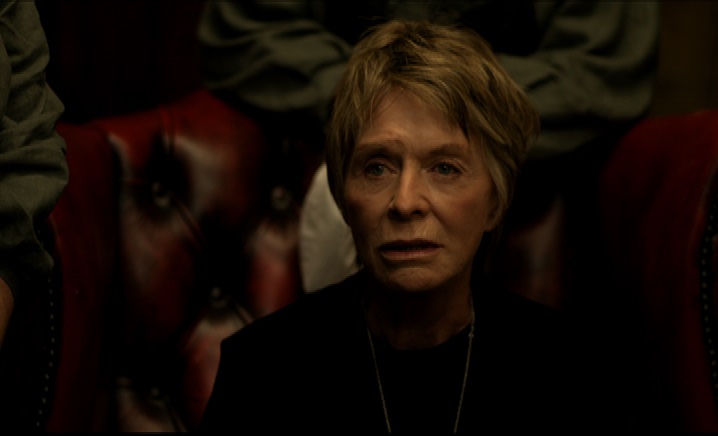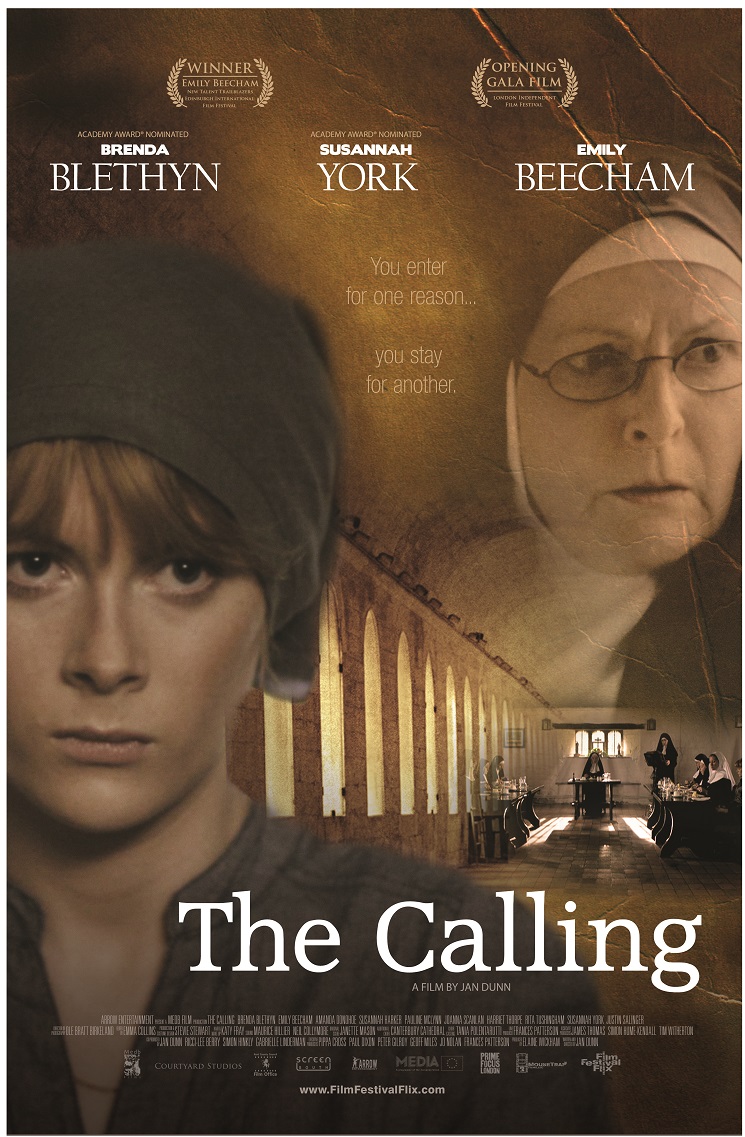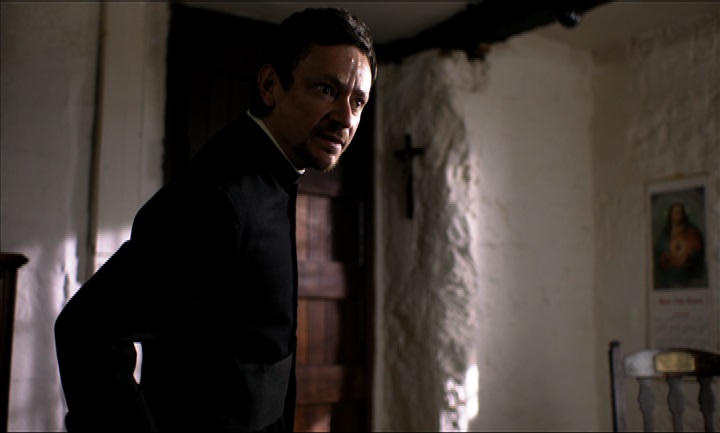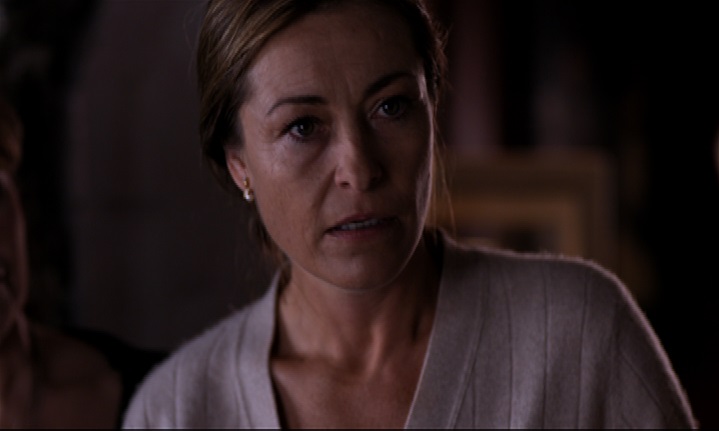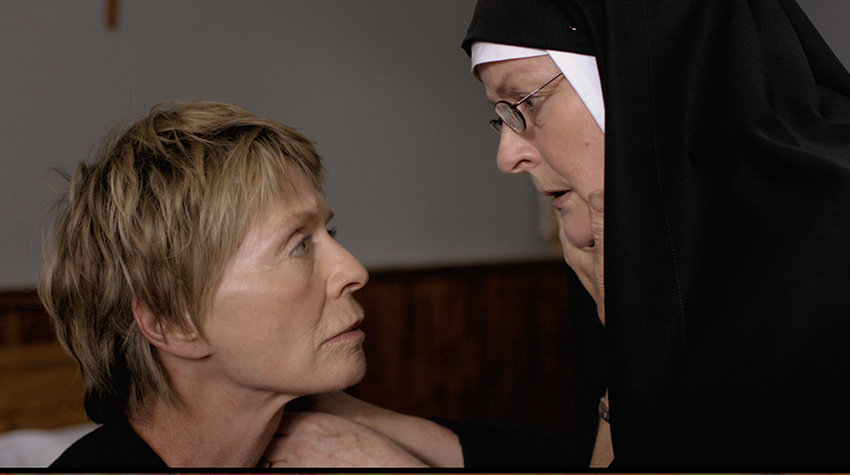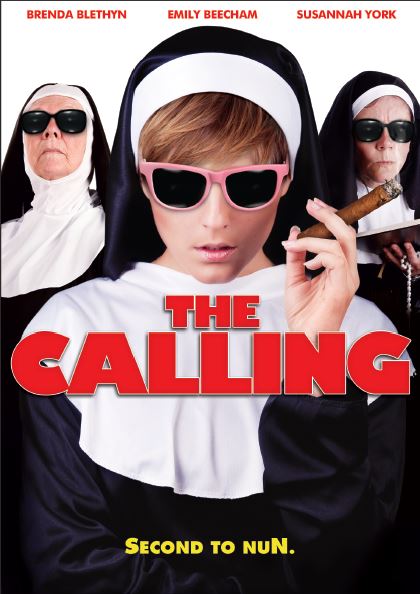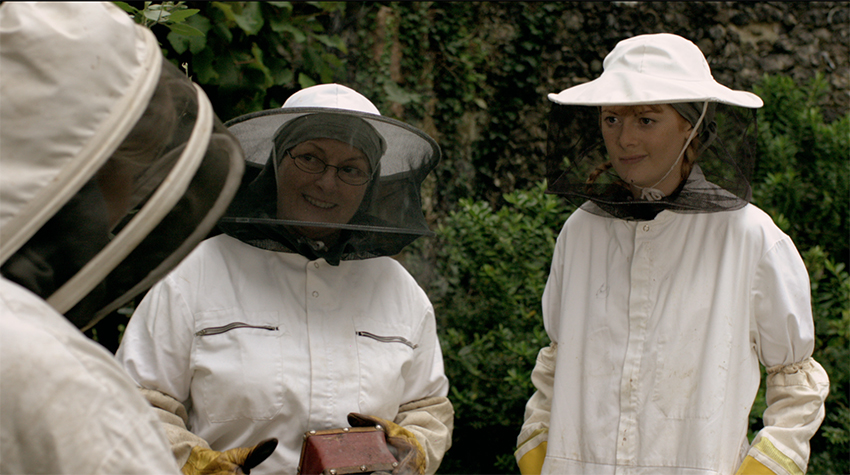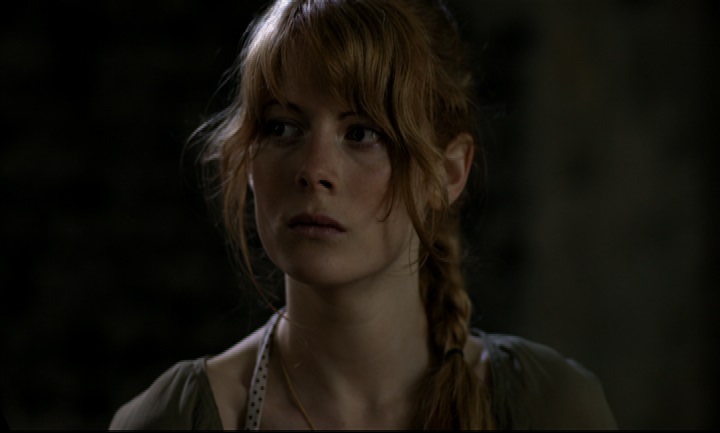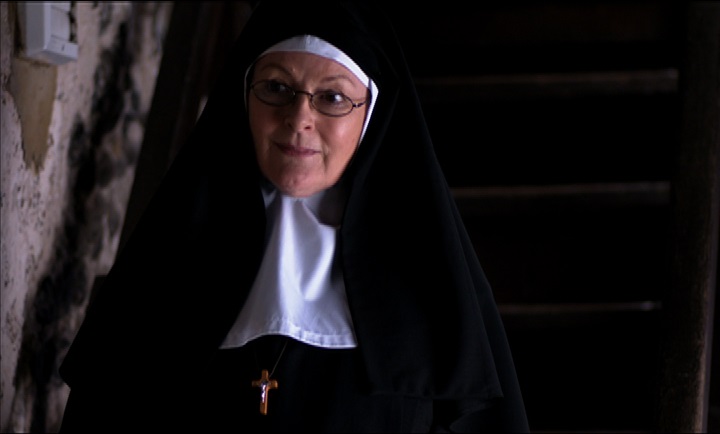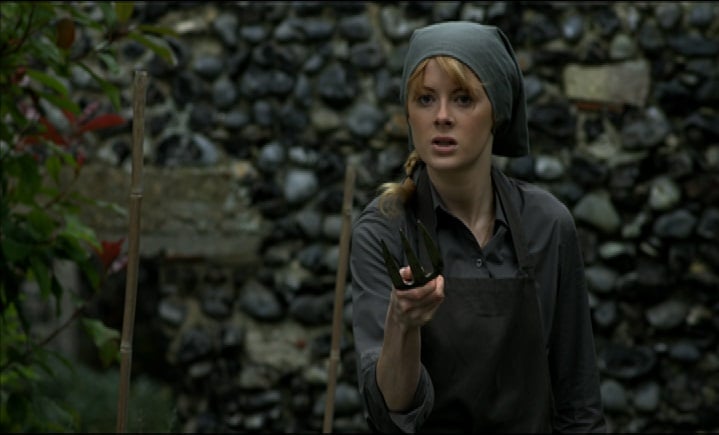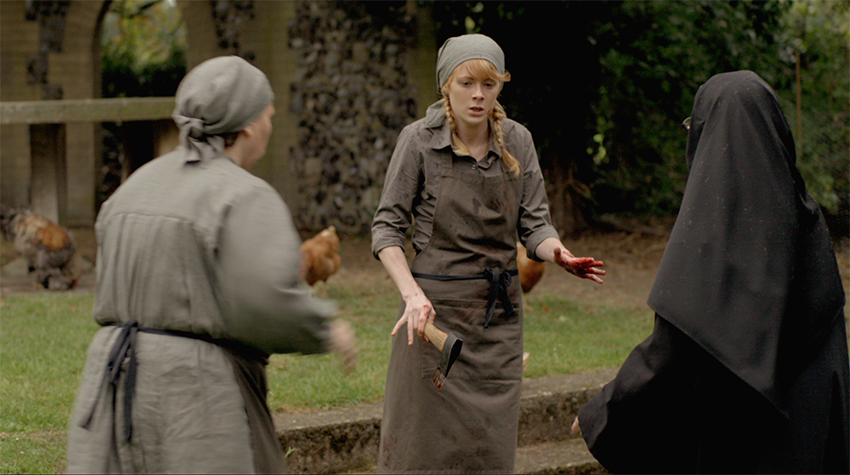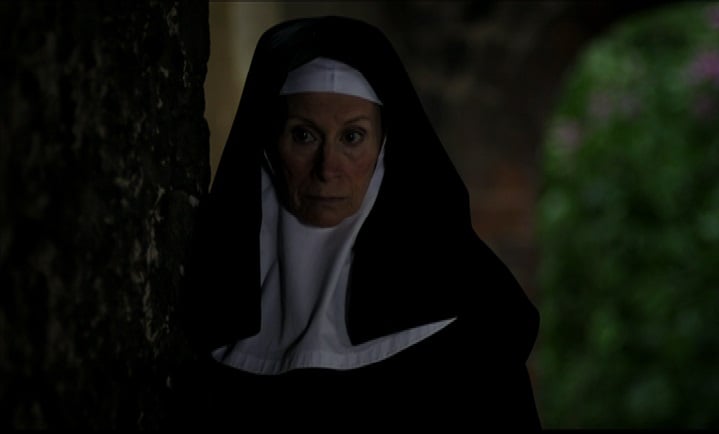The Calling
Synopsis: Joanna is about to graduate from University with her whole life set up for her but she has decided to face up to a truth she has been avoiding her whole life. Since she was small, she has had the desire to become a Nun. She is set on joining a closed order of Benedictines. Her best friend cannot believe it, her boyfriend is devastated and her mother feels it’s just a phase. The only encouragement she gets is from the family’s religious housekeeper, Consuela. When she finally gets to the convent, the liberalism of a politically active Novice Sister, Ignatious and a bunch of women with border-line mental illness, including a psychotic Mother Superior, an alcoholic football fan in charge of the vineyard, an over-pious floor mopper, Sister Hilda to name a few at first makes her wonder if she’s following the right path after all but as she gets to know the Sisters and the enormous community bond they all share and the spiritual love that connects them she starts to see glimpses of her own spiritual fulfillment. Several weeks into her vocation she discovers something in herself which brings a whole new series of secrets out into the open until eventually the bond she has with Sister Ignatious dictates and assists in her destiny.
Genre
Rated
Language
Run Time
Starring
Emily Beecham (Joanna)
Susannah York (The Prioress)
Rita Tushingham (Sister Gertrude)
Amanda Donohoe (Trish)
Chloe Sirene (Vivie)
Susannah Harker (Sister Ambrose)
Pauline McLynn (Sister Hilda)
Corin Redgrave (The Bishop)
Justin Salinger (Father Kieren)
Joanna Scanlan (Sister Kevin)
Harriet Thorpe (Consuela)
Directed by
Written by
Produced by
Director's Statement
Once again my film has been written entirely around constraints of budget and location. When I set out on such restricted journeys, I am never entirely sure what kind of production value I can attain to but pretty much set out with my fingers crossed, gifted with a wonderful creative team.
When I feel confident that a realistic film budget may be raised for my films, I will write and shoot in a more traditional manner with more traditionally commercial fare. Unfortunately most filmmakers today have to be aware from the outset of the market place and their (ie: my) value in it.
As with my first two films, I am driven to write on contemporary social issues but unlike Gypo and Ruby Blue, this time it was my intention to create something a little more gentle and less gritty in its dramatic delivery, more measured and a little more idiosyncratic. I’ve always been fascinated by people who commit to one spiritual teaching and I started with the question of why would a young girl nowadays give up a modern life and all its excesses to devote herself to nothing but prayer and contemplation, in the perhaps naive belief that the power of the collective would help towards world change? It is a subject which has always interested me. As suspected, during my research it became apparent that this is quite rare today and the majority of British women who make the choice to commit to a spiritual teaching, of whichever denomination, tend to be over the age of forty.
How odd a Calling might seem to everyone around this girl, family and friends, particularly if there is no great religious commitment in her background?
I thought it would be interesting if that “calling” might also be hard to accept from a group of nuns who are themselves not used to young women taking their vocation seriously and instead of welcoming this young woman with open arms, they might be weary of it and perhaps a little suspicious of it lasting.
What is interesting about a calling to be with God is that there is absolutely nothing tangible to offer an audience because a calling is an internal drive. An alarming number of much older nuns seem to have had their initiation into the order forced upon them after shaming their families with pregnancy but nowadays this tends not to be hidden by an apparent “calling”. However, motherhood and/or a lack of it is a through line in the film that I wanted to commit to as it does come up regularly in interviews with nuns from any denomination and is often the ultimate reason to leave an order. This loss is something that Sister Ignatious has born and manifests in her maternal role as Novice Sister in the Priory. The idea for some that a calling is internal and for others it is divine was repeatedly met with the mantra from all the nuns and monks I spoke with that you “Enter for one reason, and stay for another ”. A phrase I decided to use on more than one occasion with the dialogue. Unlike my other films, where the dialogue was written within the prose of my screenplay, this time I established every line of dialogue within the structure of the screenplay in a traditional sense.
It is strange to me that for one person, a commitment to God can lead to something extreme like a violent act such as strapping a bomb to ones body and blowing something up with a lot of people around. Yet for another person a commitment to God might mean a different kind of extreme as joining a cloistered order of Benedictines where ones whole time is taken up with prayer, meditation and ecumenical conversation. My lead character of Joanna in the end, “finds her own way ” of changing the world and doing something to make a difference.
Yet with all the questions around why someone would choose to join a closed order of monks or nuns at the same time there is something very attractive about a contemplative life in a countryside Priory that many people might relate to as an escape. The element of escape might be the easiest for a modern audience to acknowledge. So it was a determined choice to make my protagonist come from a more privileged background with very little in her life she would need to escape from.
Inspiration:
The over all inspiration for this fictional order of nuns came from our resident local nuns in Minster Abbey, Kent, just a few miles from where I live in Ramsgate. This is a closed order of thirteen Benedictine Nuns in an Abbey which has stood since the sixth century when Pope Gregory landed to begin his mission to bring Christianity to Britain. There have been resident monks or nuns since that time and still enclosed there today. A short walk away from my house is St.Augustine’s Abbey, where the resident local Benedictine monks live, chanting five times a day in the public church across the road (accessed by a tunnel under the road). It’s a strange atmosphere of being somewhere else in time and yet in the modern world. They spend several times a day in silent, contemplative prayer or chanting, eating in silence whilst being read to and yet at the same time engage in trips to Tesco’s, the dentist, or doctor and have to deal with their own blogs and emails. We even got to borrow some bee-keeping gear from them and a donation of real Sanctuary honey as props.
Sister Ignatious, played by Brenda Blethyn:
As the spiritual Mentor to this young girl, I wrote the Novice Sister Ignatious for Brenda Blethyn (Secrets & Lies, Little Voice,) I’ve always wanted to work with Brenda and I knew she would bring something special and very real to Ignatious. Sister Ignatious is inspired by two real life nuns, a politicised seventy four year old Franciscan Sister forever branded an outspoken and dangerous rebel by the Official Church who has been threatened by The Vatican with expulsion had it not been for numerous other religious communities standing up in defence of her signing a pro-choice ad in the New York Times, including other Sisters. Combined with the inspiration of a Benedictine Sister, sixty-nine year old Sister Joan Chittister who recently agreed to address the first international conference of a group called Women’s Ordination Worldwide. Chittister’s Prioress was sent a letter from the Vatican to issue a “precept of obedience” forbidding her to attend on pain of undefined penalties. Instead on the day of Chittisters departure for Ireland, her Prioress handed her a 127 co-signed letter from all the active nuns in their community telling the Prioress to ignore the order from the Vatican and thirty five of the younger nuns pledged that if Chittister were punished, they wanted to share her penalty.
Suffice to say what Jo finds when she gets behind the convent walls is a group of women more politicised and driven by justice and equality that she or any of her friends in the “modern” outside world had been themselves.
Shot entirely on location in Kent, my fictitious “St Bertha’s Priory” (named in homage to the first Queen of Kent who, with her husband, pagan King Æthelbert, brought Christianity to England) is a fourteenth century old Priory, Salmestone Grange in Margate, which has been privately owned just for the past four years, when it was purchased from the above mentioned Benedictine monks of Ramsgate. Nowadays it is only used for weddings and wakes.
“As a filmmaker I have been inspired by many directors such as Hitchcock, Powell, Lean, Schlessinger and the usual suspects but also by the works of Bunuel and consequently Almodover and French women auteurs such as Diane Kurys and Josiane Balasko. I hope my British background of growing up with Ealing studios comedies and dramas, combined with my love of European cinema, an unusual combo of taste shows more so in this film than my earlier ones. Although my leading lady in Ruby Blue was written especially for and starred the French screen legend, Josiane Balasko for which I am proud to say was her first English language film.” JD
Director's Bio
Writer/Director
Jan Dunn
This is Jan Dunn’s third feature film in as many years, before The Calling, she had written and directed two multi award winning, critically acclaimed feature films, Ruby Blue (UK cinemas 2008) starring Bob Hoskins and French screen legend, Josiane Balasko and Gypo, (UK cinemas 2006) starring Paul McGann, Pauline McLynn and Rula Lenska as well as a number of short films, most notably her comedies Mary’s Date and Joan and her documentary shorts, The Lumber-Jills (about women in World War Two who took over the running of forests in the UK including everything from physically chopping trees down to haulage and pit building) and Dora about the naive artist, Dora Holzhandler.
As well as winning major awards including a prestigious British Independent Film Award for Gypo, both films were critically acclaimed with four and five star reviews in mainstream publications in the UK and US. In 2006, The Hollywood Reporter stated Gypo had marked her out as “a filmmaker to watch” with Screen International calling her “a very promising new British Talent”. Jan is also attached as director to a number of projects outside those being developed by her company. She has now acquired the film rights to the best selling novel Sacred Country by British novelist Rose Tremain (OBE), she is currently adapting the screenplay herself and the film will be produced by veteran UK producer, Pippa Cross and Dunn is already attracting a top international cast.
She has a number of other projects in development with the independent film company she runs with Elaine Wickham, based in the seaside town of Ramsgate in Kent. These include a big budget action adventure and a black comedy. Their company, Maeve Films, recently won a Kent Business Award, notably for the work they have done getting young disenfranchised kids into the work place or on to higher education through the shadowing schemes they have been attaching to all their films. Dunn is particularly passionate about helping poor, working class kids as she was one herself.
She grew up in Maidenhead, Berkshire where her dad worked in a local factory and her mum was an auxillery nurse before retiring as a school dinner-lady. She believes that creatively her childhood was shaped by typically British working class nineteen seventies holidays in caravans or at Butlins holiday camps. Her family were part of the exodus to British seaside towns still enjoyed by factory workers well into the nineteen seventies, each summer in the days when the factories closed down for two weeks. Dunn believes it was inevitable that she would end up living in a seaside town.
Jan Dunn believes her destiny was changed completely by her drama teacher who discovered and encouraged a talent for acting and inspired her to read a novel for the first time aged fifteen. This lead directly to youth theatre and amateur dramatics. She went on to train as a classical actress at drama school in London and has acted in everything from Shakespeare to Shaw. She is now Industry Professor at Thanet College, Kent; has served two elected terms on the board of Women in Film, is currently on the Board for Kent Film Office and is a member of BAFTA and DirectorsUK.
Her favourite directors are Pedro Almodover, Todd Solenz, John Schlessinger, Martin Scorcese and David Lean to name just a few.
Awards
Edinburgh International Film Festival - UK - 2009
Trailblazer Award for Best Actress (Emily Beecham)
London Independent Film Festival - UK - 2009
Festival Prize for Best Actress (Emily Beecham)







